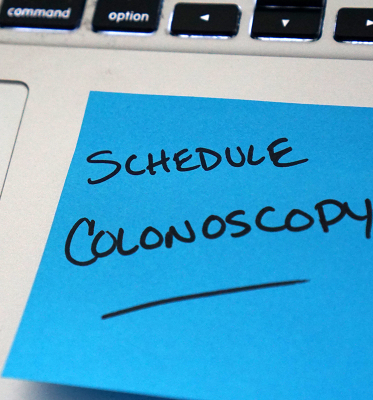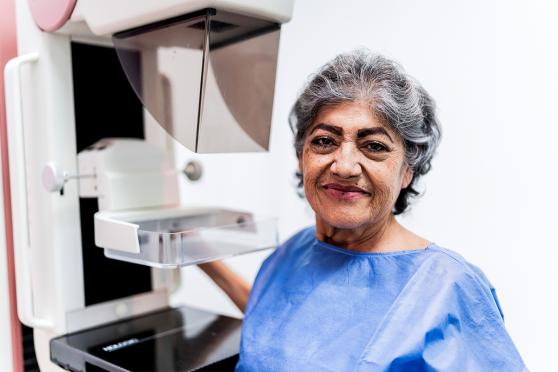The easy way to check for colorectal cancer at home
Looking for a quick, simple way to screen for colorectal cancer that doesn’t involve a doctor’s visit? A fecal immunochemical test (FIT) might be a great option.

At one point, a colonoscopy was your only option for screening for colorectal cancer. That’s a type of test where a doctor inserts a flexible tube with a light and a scope on the end into your rectum. This helps them get a close look at the inside of your colon.
But then came the fecal immunochemical test (FIT) kit. It’s an at-home test you can take if you’re at average risk for colorectal cancer. Sounds like a great alternative, right?
Before you choose a FIT kit over a colonoscopy, you need to understand your risk factors because the home tests aren’t right for everyone. It’s helpful to learn more about the tests and how they work.
Did you know HMSA members have access to personalized support to help you manage your health and well-being? Learn more here.
What does it mean if you’re at “average” risk for colorectal cancer?
If the five items below describe you, then you’re probably at average risk. Remember, it’s always a good idea to discuss your risk factors with your doctor, ideally at every annual wellness visit.
- You don’t have a personal history of colorectal cancer or certain types of polyps.
- You don’t have a history of inflammatory bowel disease.
- Your parents or siblings weren’t diagnosed with colorectal cancer before they turned 50.
- You don’t have a history of radiation treatment to the abdomen or pelvic area for a prior cancer.
- You don’t have a confirmed or suspected hereditary colorectal cancer syndrome such as familial adenomatous polyposis or Lynch syndrome.
Medicare covers screening colonoscopies every 10 years for members with an average risk for colorectal cancer and there is no minimum age requirement for the screening.

Learn more about your benefits for this important health screening. For plan information, view your Evidence of Coverage in My Account.
What does it mean if you’re at “high” risk for colorectal cancer?
The following factors could mean you’re at high risk. If any of the following apply to you, your doctor will recommend a colonoscopy instead of an at-home test.
- Family or personal history of colorectal cancer or polyps.
- History of adenomatous polyps (growths that develop in colon tissue).
- A genetic condition known as familial adenomatous polyposis, which leads to hundreds of polyps in the colon or rectum.
- Inflammatory bowel disease (Crohn’s disease or ulcerative colitis) for at least eight years.
- Lynch syndrome (an inherited predisposition to certain cancers).
- Ovarian cancer.
- Type 2 diabetes.
Medicare covers screening colonoscopies every 24 months for members with a high risk for colorectal cancer.
Looking for a primary care provider or specialist? Go to hmsa.com and use Find a Doctor to locate one near you.
Here are 9 things to know about FIT kits
If your doctor thinks that a FIT kit might be a good option for you, here are some facts to keep in mind:
1. For some people, a FIT kit is a good alternative to a colonoscopy. A FIT kit is not a replacement for a colonoscopy. But it can serve as a starting point for people with average risk factors. The American Cancer Society recommends that people who are at average risk begin screening at age 45. People in good health should continue screening through age 75. If you’re 76 to 85, ask your doctor if screenings are right for you.
Many people with average risk factors are happy to have this at-home screening option.
2. At-home colorectal cancer screenings need to be performed annually. Doctors suggest doing at-home colorectal cancer screenings once a year, not every 10 years like colonoscopies. Medicare will cover one FIT kit per year. If your FIT results are abnormal, you may need to have a colonoscopy.
Again, an at-home test is a good option if you’re at average risk of colorectal cancer. If you’re at higher risk, doctors say a colonoscopy is the way to go. And if you’re not sure of your risk, check with your doctor to decide what’s best for you.
3. A FIT kit looks for blood in your stool. Colorectal cancer and polyps can bleed when stool (poop) passes by them, but you may not be able to see such small amounts of blood. This is where a FIT kit comes in: It can detect blood you might not be able to see and it can help your doctor diagnose colorectal cancer earlier before it gets worse.
4. Get your FIT kit. So, you’re going to use a FIT kit? Ask your doctor to write a prescription for you then order your kit. You can pick it up at a pharmacy or have it sent to you in the mail. The kit typically contains the following items:
- A long brush or other collecting device.
- A card or test tube.
- A waste bag.
- An envelope for sending your stool sample to a lab.
If you have questions, check with your doctor.
5. FIT kits are noninvasive. “Noninvasive” is just a big word that means you don’t need to put any instruments inside your body. Many people appreciate that FIT kits don’t require an in-office procedure. You won’t be sedated and no special medical equipment is needed. You don’t even have to go anywhere.
6. You don’t have to do any prep. You won’t need to take laxatives or special drinks. You don’t need to restrict your diet or change the way you eat. You can take the test whenever you want.
7. It’s simple to use. The steps for most FIT kits are similar to the following:
- First, flush your toilet so the water in it is clean. Then do a bowel movement.
- When you’re done, place the used toilet paper in the waste bag. Don’t put the toilet paper in the toilet bowl.
- Dip the end of the brush into the toilet water and scrape the stool.
- Brush the stool sample on the test card.
- Put the used brush in the waste bag and discard it.
- Mail the test card to the address provided. If there are steps for getting your results at home, follow those steps.
Your kit’s instructions might be slightly different. Follow the directions that are in your kit.
8. Mail the kit to a lab. Your test will need to be evaluated at a lab. You’ll send the test card in the envelope that’s provided. Your test results will go to your doctor. Results from this test are about 80% accurate.
9. Positive results from a FIT kit don’t necessarily mean you have colorectal cancer. If the FIT kit detects blood in your stool, your results will come back positive. But because FIT kits can’t diagnose you with colorectal cancer, your doctor will have you follow up with a colonoscopy. That’ll give you the most comprehensive answer.
It’s important to remember that small amounts of blood in your stool can mean many things besides cancer. For instance, the blood could be from hemorrhoids or ulcers.
Do I have any other options for colorectal cancer screening?
Besides a FIT kit, another at-home colorectal cancer screening option is Cologuard. This test looks for blood in your stool and abnormal DNA or blood cells. Cologuard costs more than a FIT kit. Check with your insurance provider to find out whether it’s covered under your plan.
Additional sources:
FIT kit overview: National Library of Medicine
Guidelines for colorectal cancer screening: American Cancer Society
Understanding colorectal cancer screening tests: American Cancer Society
What you need to know about at-home colorectal cancer screenings: Cedars-Sinai
H3832_8750_848451_5MS538_24_C
© 2023, Linkwell Health, Inc. All content owned or licensed by Linkwell Health, Inc. All rights reserved.


